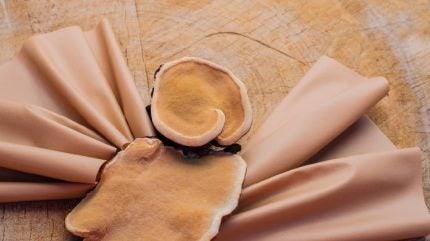
CEO Matthew Scullin revealed this decision through a letter to stakeholders, partners, and the industry, which he shared publicly on his LinkedIn account.
This significant change seeks to address persistent challenges in the mycelium leather industry, where adoption remains low due to issues of “scale and cost”.

Discover B2B Marketing That Performs
Combine business intelligence and editorial excellence to reach engaged professionals across 36 leading media platforms.
Under Scullin’s leadership, MycoWorks has been committed to developing its Fine Mycelium technology and the Reishi leather product over the past eight years.
While these innovations have been well-received by designers globally, challenges in replacing traditional leather with mycelium persist, particularly concerning tear and tensile strength, as per the letter.
MycoWorks addressed these challenges by introducing an updated version of its Rei-Tan technology, increasing the tensile strength of mycelium from around four megapascal (MPa) to 18MPa, enhancing its durability by four to five times.
This improvement positions mycelium as a viable substitute for leather while maintaining its unique qualities.

US Tariffs are shifting - will you react or anticipate?
Don’t let policy changes catch you off guard. Stay proactive with real-time data and expert analysis.
By GlobalDataThe updated Rei-Tan technology applies to any mycelium production process worldwide, not just those using MycoWorks’ Fine Mycelium grown in South Carolina.
In addition, the technology can be integrated into existing leather tannery networks globally, enhancing both the quality and market readiness of mycelium-based products.
Aligned with these developments, MycoWorks decided to transition to sourcing and tanning mycelium, instead of growing it.
This will result in the closure of the company’s plant in South Carolina.
The factory played a key role in overcoming early biomanufacturing challenges, according to the letter. However, it now faces a “cost of capital that is too high to warrant” continued operation, especially when cheaper mycelium sources exist that can be enhanced with Rei‑Tan technology.
Scullin said that the company will aim to source and enhance mycelium from other regions using the improved Rei-Tan process.
The move will impact some members of the MycoWorks team, who he described as being instrumental in reaching this pivotal stage.
“We are deeply grateful to our employees, brand partners, and investors who have gotten us here,” the letter reads.
In February this year, MycoWorks claimed that its Fine Mycelium material Reishi outperformed established luxury leather benchmarks, redefining expectations for both biomaterials and alternative leather solutions.





